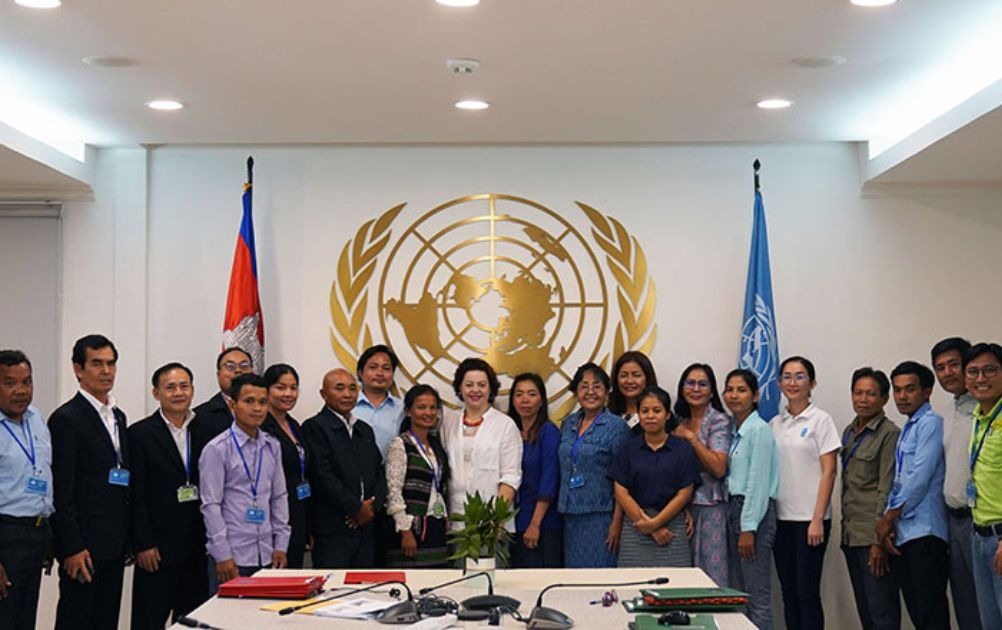
Contributors: Ngin Navirak (SGP National Coordinator, UNDP Cambodia), Sovanna Nhem (Climate and Forests Specialist, UNDP Cambodia), Petra Pontier (Assistant Policy Analyst - Environment and Climate Change, UNDP Cambodia), and UNDP’s Climate and Forests Team
For millennia, Indigenous Peoples (IPs) have been the stewards and protectors of the lush forests of Cambodia. Their ancestral knowledge and practices are vital to protecting biodiversity and preserving ecosystems, making this a win for all of humanity.
The recognition of the role of IPs in Cambodia’s National REDD+ Strategy and their inclusion in global agreements like the Paris Agreement marked significant milestones. Cambodia’s Nationally Determined Contribution (NDC) set ambitious forest and climate action goals, aiming to slash greenhouse gas emissions by 42% by 2030. Half of that reduction is expected to come from addressing historical deforestation. Nevertheless, the government has set the bar even higher with the adoption of the Long-Term Strategy for Carbon Neutrality (LTS4CN) in 2021. This ambitious strategy set the ambition for achieving carbon neutrality in the Forest and Other Land Use (FOLU) sector by 2031 and net-zero deforestation by 2045.
Achieving these ambitious goals requires Indigenous ancestral knowledge. Experience shows that forests and land under IPs' care thrive better compared to those managed elsewhere - a testament to generations of sustainable practices embedded in their culture. Likewise, for Cambodia to be able to fulfill its NDC’s forest commitments, embracing IP solutions is essential for success.
Cambodia's NDC commits to promoting IP land rights and respecting their traditional knowledge as crucial climate change mitigation measures. Mechanisms for channelling required financial support directly to IP organizations and communities are crucial to support their initiatives for climate change mitigation and adaptation and sustain their traditional resources management systems. This would drive not only the achievement and future revision of the NDC but also empower Indigenous community members, including women, youth, and persons with disabilities, to continue their work as active stewards of their land and forests.
UNDP has a policy of engagement with IPs. Recognizing the crucial role of IPs in achieving the NDCs within the FOLU sector, UNDP advocates for the participation and inclusion of IP perspectives in climate actions and policies and supports them through direct funding and capacity development of IP-led organizations. Supporting community-based contributions to achieve the NDCs promotes Indigenous knowledge and puts Indigenous communities at the forefront of climate change and biodiversity solutions.
In response to the well-established need for direct funding for Indigenous solutions, a new dedicated funding window has been established under UNDP’s Climate Promise[1] in the Forest, Land, and Nature (FLN) area that offers grants for IP-led solutions for forest and climate action. This funding window builds on the experience, structure, and networks of UNDP Cambodia’s Small Grants Programme (SGP) and the previous Community-Based REDD+ initiative.
An expression of interest was issued in October 2023. As a result, 39 IP organizations and communities were selected and trained in proposal writing. A total of 15 proposal submissions was later received to secure funding to implement activities in the National REDD+ Strategy, a critical component in achieving Cambodia's NDC forest targets under the Paris Agreement. A rigorous and transparent evaluation process, based on established criteria, selected five proposals for financial support following technical screening and field appraisals conducted by the SGP Team and the National Steering Committee (NCS). Additionally, a delegation from our development partner, UK’s Department for Environment, Food & Rural Affairs (DEFRA), participated in one of the field appraisals, which took place in Kampong Thom province.
The Grant Awarding Ceremony was held in Phnom Penh in March 2024, and was attended by representatives of the 5 selected organizations: Osoam Community, Indigenous Bunong Community of Antres Village, North-Eastern Cottage Organisation, Kampong Domrey, and Anlong Phe Community Protected Areas.
The winning projects aim to strengthen the capacities of local rangers to manage community protected areas, promote sustainable livelihoods, document traditional practices and increase knowledge on land tenure and recognition of IP rights. The SGP team and UNDP Cambodia will continue to support the organizations by developing their capacity for project management and reporting. Regular monitoring and evaluation visits to the selected projects will also be carried out to ensure successful implementation.
This funding window not only created space for testing operational procedures and improving cooperation with Indigenous communities, but it ultimately created a pathway for enhancing field-level capacities of IPs, solidifying their crucial role in achieving national forest targets.

